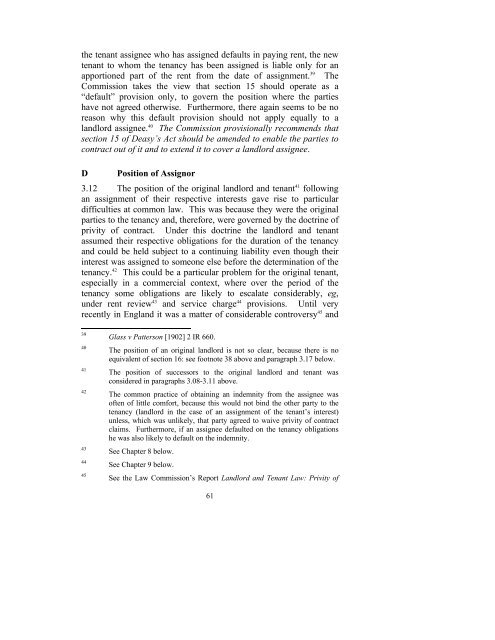Consultation Paper on the General Law of the Landlord and Tenant
Consultation Paper on the General Law of the Landlord and Tenant
Consultation Paper on the General Law of the Landlord and Tenant
You also want an ePaper? Increase the reach of your titles
YUMPU automatically turns print PDFs into web optimized ePapers that Google loves.
<strong>the</strong> tenant assignee who has assigned defaults in paying rent, <strong>the</strong> newtenant to whom <strong>the</strong> tenancy has been assigned is liable <strong>on</strong>ly for anapporti<strong>on</strong>ed part <strong>of</strong> <strong>the</strong> rent from <strong>the</strong> date <strong>of</strong> assignment. 39 TheCommissi<strong>on</strong> takes <strong>the</strong> view that secti<strong>on</strong> 15 should operate as a“default” provisi<strong>on</strong> <strong>on</strong>ly, to govern <strong>the</strong> positi<strong>on</strong> where <strong>the</strong> partieshave not agreed o<strong>the</strong>rwise. Fur<strong>the</strong>rmore, <strong>the</strong>re again seems to be noreas<strong>on</strong> why this default provisi<strong>on</strong> should not apply equally to al<strong>and</strong>lord assignee. 40 The Commissi<strong>on</strong> provisi<strong>on</strong>ally recommends thatsecti<strong>on</strong> 15 <strong>of</strong> Deasy’s Act should be amended to enable <strong>the</strong> parties toc<strong>on</strong>tract out <strong>of</strong> it <strong>and</strong> to extend it to cover a l<strong>and</strong>lord assignee.D Positi<strong>on</strong> <strong>of</strong> Assignor3.12 The positi<strong>on</strong> <strong>of</strong> <strong>the</strong> original l<strong>and</strong>lord <strong>and</strong> tenant 41 followingan assignment <strong>of</strong> <strong>the</strong>ir respective interests gave rise to particulardifficulties at comm<strong>on</strong> law. This was because <strong>the</strong>y were <strong>the</strong> originalparties to <strong>the</strong> tenancy <strong>and</strong>, <strong>the</strong>refore, were governed by <strong>the</strong> doctrine <strong>of</strong>privity <strong>of</strong> c<strong>on</strong>tract. Under this doctrine <strong>the</strong> l<strong>and</strong>lord <strong>and</strong> tenantassumed <strong>the</strong>ir respective obligati<strong>on</strong>s for <strong>the</strong> durati<strong>on</strong> <strong>of</strong> <strong>the</strong> tenancy<strong>and</strong> could be held subject to a c<strong>on</strong>tinuing liability even though <strong>the</strong>irinterest was assigned to some<strong>on</strong>e else before <strong>the</strong> determinati<strong>on</strong> <strong>of</strong> <strong>the</strong>tenancy. 42 This could be a particular problem for <strong>the</strong> original tenant,especially in a commercial c<strong>on</strong>text, where over <strong>the</strong> period <strong>of</strong> <strong>the</strong>tenancy some obligati<strong>on</strong>s are likely to escalate c<strong>on</strong>siderably, eg,under rent review 43 <strong>and</strong> service charge 44 provisi<strong>on</strong>s. Until veryrecently in Engl<strong>and</strong> it was a matter <strong>of</strong> c<strong>on</strong>siderable c<strong>on</strong>troversy 45 <strong>and</strong>39404142434445Glass v Patters<strong>on</strong> [1902] 2 IR 660.The positi<strong>on</strong> <strong>of</strong> an original l<strong>and</strong>lord is not so clear, because <strong>the</strong>re is noequivalent <strong>of</strong> secti<strong>on</strong> 16: see footnote 38 above <strong>and</strong> paragraph 3.17 below.The positi<strong>on</strong> <strong>of</strong> successors to <strong>the</strong> original l<strong>and</strong>lord <strong>and</strong> tenant wasc<strong>on</strong>sidered in paragraphs 3.08-3.11 above.The comm<strong>on</strong> practice <strong>of</strong> obtaining an indemnity from <strong>the</strong> assignee was<strong>of</strong>ten <strong>of</strong> little comfort, because this would not bind <strong>the</strong> o<strong>the</strong>r party to <strong>the</strong>tenancy (l<strong>and</strong>lord in <strong>the</strong> case <strong>of</strong> an assignment <strong>of</strong> <strong>the</strong> tenant’s interest)unless, which was unlikely, that party agreed to waive privity <strong>of</strong> c<strong>on</strong>tractclaims. Fur<strong>the</strong>rmore, if an assignee defaulted <strong>on</strong> <strong>the</strong> tenancy obligati<strong>on</strong>she was also likely to default <strong>on</strong> <strong>the</strong> indemnity.See Chapter 8 below.See Chapter 9 below.See <strong>the</strong> <strong>Law</strong> Commissi<strong>on</strong>’s Report <strong>L<strong>and</strong>lord</strong> <strong>and</strong> <strong>Tenant</strong> <strong>Law</strong>: Privity <strong>of</strong>61
















